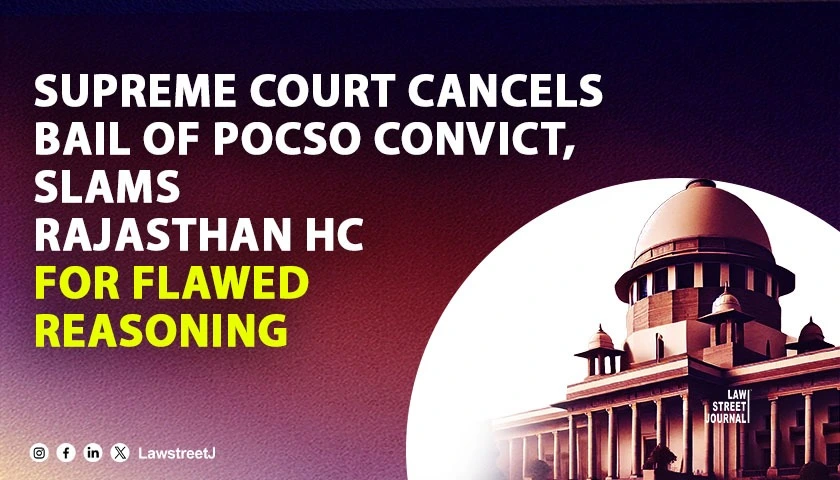New Delhi: The Supreme Court has set aside a Rajasthan High Court order that suspended the sentence and granted bail to a man convicted under the POCSO Act for sexually assaulting a minor girl, strongly criticizing the High Court’s failure to properly assess the convict’s chances of acquittal.
Justice K.V. Viswanathan delivered the judgment on August 6, 2025, in Criminal Appeal No. 69 of 2025, filed by Jamnalal, the father of the prosecutrix, challenging the High Court’s order dated September 3, 2024.
The convict had been sentenced to 20 years’ rigorous imprisonment under Sections 3/4(2) of the POCSO Act and ordered to pay a fine of ₹50,000. After serving only 1 year and 3 months, his sentence was suspended by the High Court, which granted him bail.
The Supreme Court noted that the High Court’s reasoning for granting bail was inadequate, stating:
“The High Court, while suspending the sentence, after setting out the contention of the respective parties, has recorded only the following reasons before enlarging Respondent No. 2 on bail.”
The High Court had based its decision on factors such as the absence of signs of sexual assault found by medical experts, the unavailability of FSL and DNA reports, and questioning why the prosecutrix would go outside to relieve herself despite washrooms being available in the house.
Justice Viswanathan emphasized the proper test for suspension of sentence under Section 389 CrPC, citing the principle established in Omprakash Sahni v. Jai Shankar Chaudhary:
“The endeavour on the part of the court, therefore, should be to see as to whether the case presented by the prosecution and accepted by the trial court can be said to be a case in which, ultimately, the convict stands for fair chances of acquittal.”
The Court observed that this test requires looking for “something palpable” or “very apparent or gross on the face of the record” rather than reappreciating evidence or picking up minor lacunae in the prosecution’s case.
The Supreme Court was particularly critical of the High Court’s reasoning, stating:
“The reasoning of the High Court, set out above, falls far short of the parameters required under Section 389 CrPC for enlargement of a convict punished for a heinous offence on bail after suspending the sentence.”
The Court noted that the prosecutrix’s testimony was consistent, stating that she was taken at gunpoint by the accused, who forcibly took her to a house and committed rape. The trial court had found no material contradictions in the evidence and had properly established the victim’s age as 14 years and 3 months at the time of the incident.
Significantly, the Supreme Court considered the convict’s criminal antecedents, noting that out of 11 cases mentioned in a chart provided by the State, 5 had ended in acquittal and 6 were pending, indicating a pattern of criminal behaviour.
The Court also addressed the State’s submission that an FSL/DNA report, received after the trial, showed the presence of male DNA/semen of the accused on the victim’s private parts and underwear, though it refrained from commenting on its merits.
Justice Viswanathan described several aspects of the High Court’s reasoning as “completely untenable,” particularly its finding that no sexual assault was established without considering the overall nature of evidence, and its “conjectural” reasoning about the victim going outside despite available washrooms.
The Supreme Court cited Vijay Kumar v. Narendra, emphasizing that courts must consider “the nature of the accusation made against the accused, the manner in which the crime is alleged to have been committed, and the gravity of the offence” when deciding bail applications for serious offences.
The Court clarified that its observations were made solely for the purpose of setting aside the suspension order and directed the convict to surrender before the Special Judge (POCSO), Karauli, on or before August 30, 2025, failing which the State would take him into custody.
Case Title: Jamnalal vs. State of Rajasthan & Anr.













